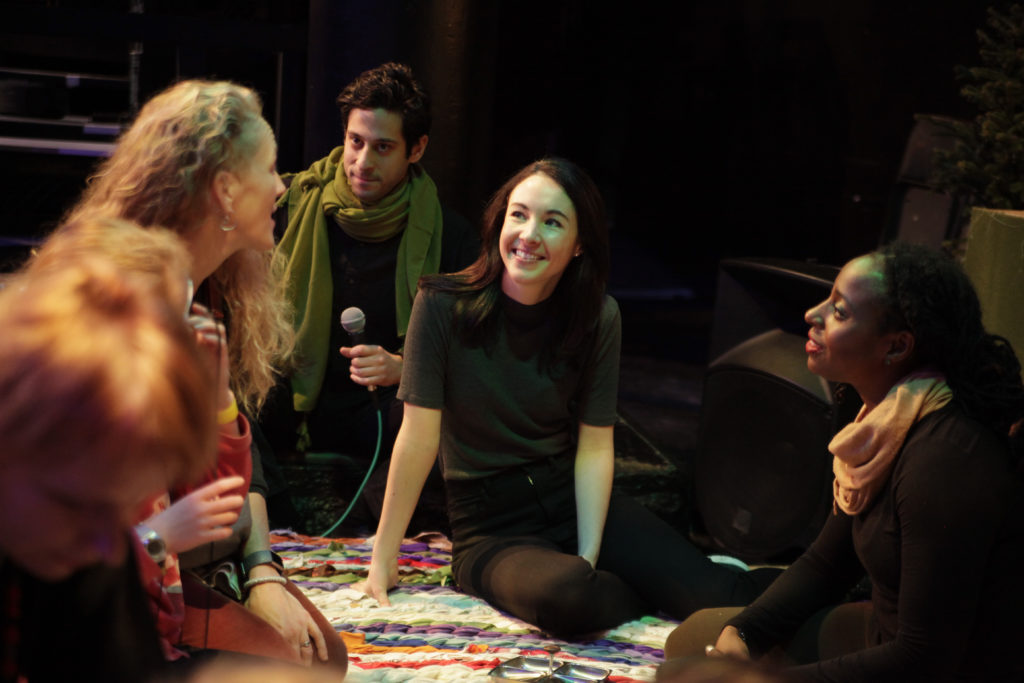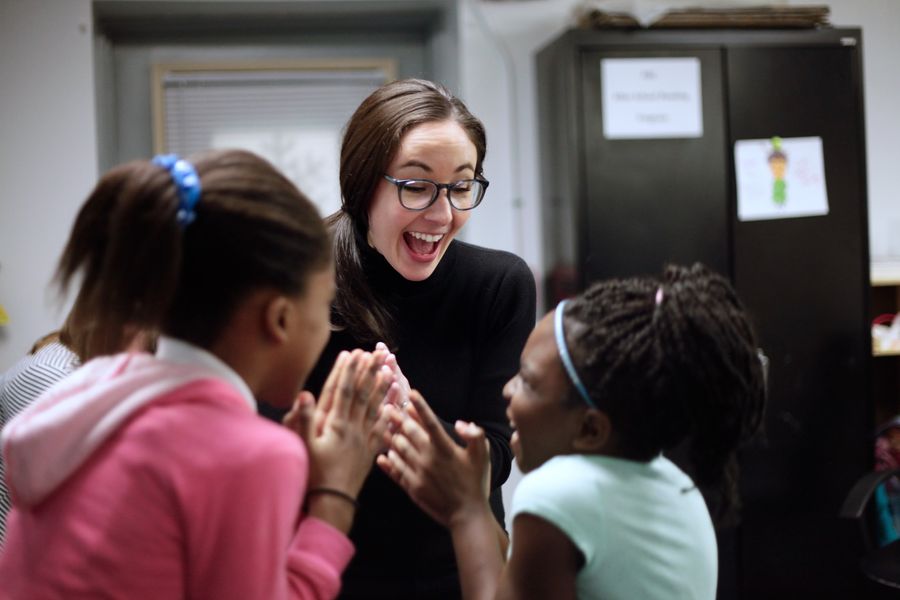NEW YORK CITY: Theatre for Young Audiences USA (TYA/USA) has named Sara Morgulis to be its next executive director, starting June 6. Following an extensive national executive search, the TYA/USA board unanimously selected Morgulis to lead the national organization representing the creative community committed to the professional field of theatre for children, young adults, and families.
Morgulis succeeds Jonathan Shmidt Chapman, who served as executive director for five years. Said Nina Meehan, TYA/USA board chair, in a statement, “Jonathan has been an incredible leader for the past five years, bringing TYA/USA to both a broader constituency than ever before and deepening our relationships across the field. Sara is the absolute perfect person to continue that growth and introduce new and exciting strategic initiatives that reflect this unique moment in theatre.”
With over 15 years of extensive experience in both arts programming and arts education, Morgulis has dedicated her career to accessibility and inclusivity. She most recently served as the director of education at New York City Children’s Theater, where she led arts education programs that annually served 100 NYC public schools, community centers, and homeless shelters. For four years, she also led the theatre and music portion of the Afterschool Reading Club (ARC) program, which brought literacy-based arts programming to students in grades pre-K to 5 at 36 homeless shelters across the city every week. In 2021, she created the “Trauma-Informed Toolkit for Educators,” an online resource designed to provide educators with a deeper understanding of trauma and its effects on childhood development. She spearheaded the development of sensory-friendly performances in New York City Children’s Theater’s mainstage season, and an usher training and employment program for people with disabilities.
Said outgoing executive director Chapman in a statement, “I am beyond thrilled for TYA/USA and the greater TYA field that Sara Morgulis will be our next leader. The breadth and depth of her experience as an artist, educator, and leader inspire me. She has the vision, heart, and energy to brilliantly carry the organization into its next chapter.” In his time, Chapman co-authored Envisioning the Future of Theatre for Young Audiences, a report with the National Endowment for the Arts, and grew the organization from 780 members to nearly 1,200 theatres, organizations, and individual arts professionals across 46 states.
I spoke to Sara last week about her background and her plans for the organization.
ROB WEINERT-KENDT: First of all, congratulations. Tell me a little bit about what brought to you this point.
SARA MORGULIS: I have such a deep love and understanding of TYA because of the many roles I’ve served within the sector. I was a TYA actor when I was a young person, and then moved to the educator space and became a director and a freelance producer. And I worked in the education department in New York City Children’s Theatre, and with a neuro-inclusive theatre company called Action Play, for the past 10 years. So I’ve played in all areas, from the boardroom to the classroom to the rehearsal room. In all of those roles, my personal mission has been to create accessible and inclusive theatre for the young people of New York. And I came to TYA/USA because I’ve been most passionate about creating and facilitating community for sharing resources and ideas, and offering mentorship and supporting the careers of young artists. So when this opportunity arose, I recognized that it would give me the platform to do what I love most, now on a national level.
Will this mean you won’t be making as much theatre yourself, but instead serving and supporting the work of others?
Right, and I’m absolutely thrilled to be doing that. This is such an important moment for TYA; I believe that our work now is more important than ever, because it is going to support families and their collective healing. In the past two years, I’m also a new parent, so I understand the inherent need for this. The sad fact is that over 200,000 children in the U.S. have lost a parent or a caregiver due to COVID. And I believe that creative play is the way to rebuild our brains after trauma and after collective crisis. Unlike any other art form, theatre invites young people to watch a story onstage and process what they’re going through through the power of empathy, and to help them dream about their futures. So I’m thrilled to be able to lead this field at a time that our work is transformative in young people’s lives, and communities really need theatre for young audiences more than ever.
What are some of the main challenges that face the field, and what are your plans to address those challenges?
During the pandemic, the entire theatre industry has questioned the nonprofit producing model, and TYA is in that conversation as well. So we are reconsidering producing models to be more sustainable, encouraging new-work development, and most importantly prioritizing equity and access. In the last few years, there’s been a lot of energy spent in creating [Equity, Diveristy, and Inclusion] plans. And now the work is figuring out how to embed these values in the institutional fabric of our theatres. These action items need to be transformed into lasting and sustainable systems that don’t place the burden of the work on to the BIPOC members of TYA theatres.
During the pandemic, our members overcame enormous challenges by supporting each other as a resilient community. And Jonathan Shmidt Chapman connected with the membership through monthly affinity calls, where the staff provided a space to share resources and, most importantly, give folks an opportunity to process what they were going through together. Our sector created innovative new virtual programming, which served as a beacon for folks who needed that guiding light, and TYA co-produced the Listen Learn Lead series with Arts in Color, which gathered thousands of TYA artists and leaders in learning and taking corrective actions, specifically around anti-racism. I’m excited to continue that great work.
TYA is often conflated with education and the work of schools, another sector that has faced enormous challenges in the past few years. Is your work tied to the fortunes of public education, or am I playing into a common misconception?
I mean, as a field it certainly encompasses arts in education, and our membership includes teaching artists, arts administrators, and public school educators. So we are definitely considering all of those challenges within our work as well. But when I think about TYA, I don’t just think about theatre for young audiences. Our reach is broader, and we as a community create theatre for families, theatre for communities, and theatre for educators as well. It’s really theatre for the next generation. I believe our work is civic practice, because we are creating art to empower young agents of change, who are going to be the next generation.
It also strikes me that part of your service is not only to the next generation of audiences, but also to artists in this field.
One of the most inspiring things that has come out of the last year, in terms of how to fund and support early career theatremakers and artists, is that TYA/USA has partnered to help launch the Reimagine: New Plays in TYA program, which really empowers playwrights and flips the traditional model on its head. It’s an application program where theatres had to apply to host one of the playwrights, which reverses the typical new-work development process. So suddenly the playwrights were interviewing the interested theatres, and they were the ones who chose their match. I want to continue that sort of work, which puts funding and mentorship and support in the hands of these new TYA playwrights, because that is how the greatest work is going to be created.
Also, I benefited from this aspect of TYA/USA; in 2015, I won the TYA/USA Ann Shaw fellowship, which funded a research trip to London, and that helped to catapult my career. So I’m excited to give that back to young artists as well.

A lot of your work has been around championing access not only for children with disabilities to experience this work, but artists with disabilities to create it. Can you talk about that?
It’s been a huge focus of my career. With Action Play, I’ve been working to create self-advocacy-driven and employment-focused arts programming for and with disabled artists. And I work as an accessibility and disability inclusion consultant for nonprofits. So I am really excited to uplift access and inclusion on this national platform. I want to share a quote that has really driven me through my career. There’s a choreographer named Alice Sheppard who states that access, in all its complexities, is an aesthetic in the work itself, as well as a way of building a relationship with our audience. It is an invitation to relationship, not a checklist of things to be done. I’m excited to work with TYA theatres across the U.S. and beyond with that focus: How can we create with access as a fundamental aesthetic of our TYA work, not something that we tack on afterwards? How can we bake access into our creative process?
I noticed that I’m calling you on a Pennsylvania area code. Is there a story there?
I would love to tell it. I grew up with People’s Light in Malvern, Pa., as really my second home. They’re the folks that honestly helped raise me; they’re the reason that I’m doing this work today. I was hired as an actor when I was a child to act in their shows alongside their resident company members. People’s Light’s whole philosophy around arts education was that the young people were treated as professionals. I think that ingrained a deep respect for theatre and for professionalism in me at a really young age. I would love to name a mentor of mine really early on: David Bradley, who was their director of education at the time. He helped steer me toward the idea of being an educator, so when I was a teenager, I started assistant teaching. And then I went on to college and was mentored by Lauren Unbekant, the director of education at Syracuse Stage. Mentorship has been such an enormous theme throughout my entire career. I am in the place that I am because of the extraordinary mentors I had as a young person who helped steer me in the right direction, and help me build my confidence and my creativity, and all of these really important turning points.
You mentioned you’ve become a new parent. Tell me about that.
I’m a new parent of a nine-month-old named Hunter. He has not yet been to his first live Theatre for the Very Young (TVY) show yet; he experienced his first virtual TVY show a couple of weeks ago, by an extraordinary bilingual multilingual theatre company called Jugando N Play. So I’m really looking forward to experiencing TVY as a parent; I’ve been going to these shows for the last 10 years as the one single adult in the room without a child, so Hunter’s presence in my life is bringing an exciting new element to my work.
Rob Weinert-Kendt (he/him) is the editor-in-chief of American Theatre. rwkendt@tcg.org


